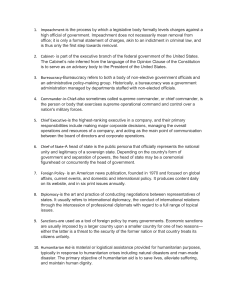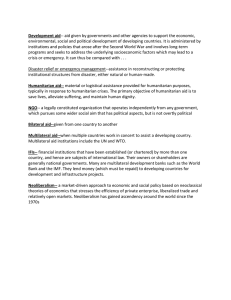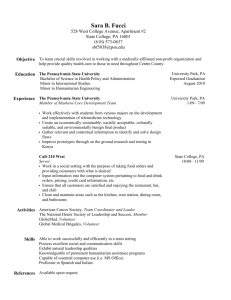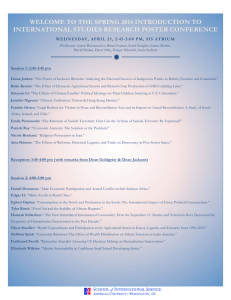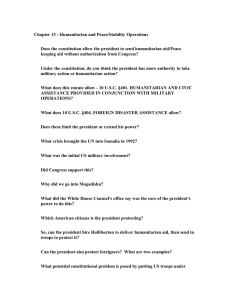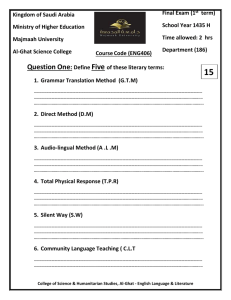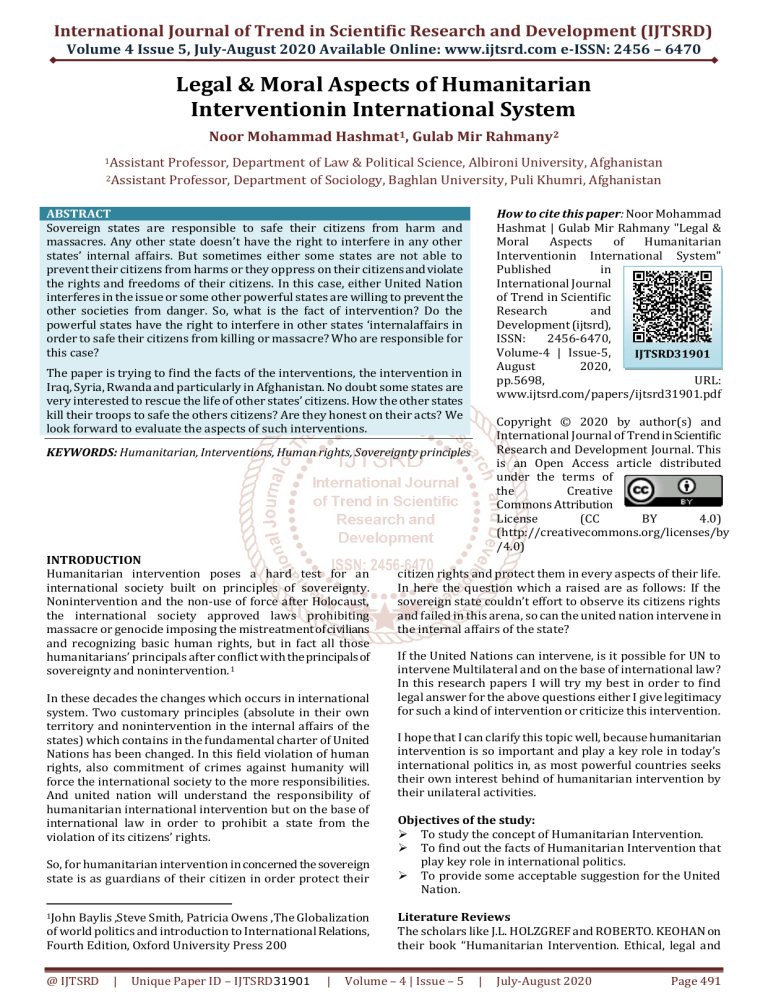
International Journal of Trend in Scientific Research and Development (IJTSRD) Volume 4 Issue 5, July-August 2020 Available Online: www.ijtsrd.com e-ISSN: 2456 – 6470 Legal & Moral Aspects of Humanitarian Interventionin International System Noor Mohammad Hashmat1, Gulab Mir Rahmany2 1Assistant 2Assistant Professor, Department of Law & Political Science, Albironi University, Afghanistan Professor, Department of Sociology, Baghlan University, Puli Khumri, Afghanistan ABSTRACT Sovereign states are responsible to safe their citizens from harm and massacres. Any other state doesn’t have the right to interfere in any other states’ internal affairs. But sometimes either some states are not able to prevent their citizens from harms or they oppress on their citizens and violate the rights and freedoms of their citizens. In this case, either United Nation interferes in the issue or some other powerful states are willing to prevent the other societies from danger. So, what is the fact of intervention? Do the powerful states have the right to interfere in other states ‘internalaffairs in order to safe their citizens from killing or massacre? Who are responsible for this case? How to cite this paper: Noor Mohammad Hashmat | Gulab Mir Rahmany "Legal & Moral Aspects of Humanitarian Interventionin International System" Published in International Journal of Trend in Scientific Research and Development (ijtsrd), ISSN: 2456-6470, Volume-4 | Issue-5, IJTSRD31901 August 2020, pp.5698, URL: www.ijtsrd.com/papers/ijtsrd31901.pdf The paper is trying to find the facts of the interventions, the intervention in Iraq, Syria, Rwanda and particularly in Afghanistan. No doubt some states are very interested to rescue the life of other states’ citizens. How the other states kill their troops to safe the others citizens? Are they honest on their acts? We look forward to evaluate the aspects of such interventions. Copyright © 2020 by author(s) and International Journal of Trend in Scientific Research and Development Journal. This is an Open Access article distributed under the terms of the Creative Commons Attribution License (CC BY 4.0) (http://creativecommons.org/licenses/by /4.0) KEYWORDS: Humanitarian, Interventions, Human rights, Sovereignty principles INTRODUCTION Humanitarian intervention poses a hard test for an international society built on principles of sovereignty. Nonintervention and the non-use of force after Holocaust, the international society approved laws prohibiting massacre or genocide imposing the mistreatment of civilians and recognizing basic human rights, but in fact all those humanitarians’ principals after conflict with the principals of sovereignty and nonintervention. 1 In these decades the changes which occurs in international system. Two customary principles (absolute in their own territory and nonintervention in the internal affairs of the states) which contains in the fundamental charter of United Nations has been changed. In this field violation of human rights, also commitment of crimes against humanity will force the international society to the more responsibilities. And united nation will understand the responsibility of humanitarian international intervention but on the base of international law in order to prohibit a state from the violation of its citizens’ rights. So, for humanitarian intervention in concerned the sovereign state is as guardians of their citizen in order protect their 1John Baylis ,Steve Smith, Patricia Owens ,The Globalization of world politics and introduction to International Relations, Fourth Edition, Oxford University Press 200 @ IJTSRD | Unique Paper ID – IJTSRD31901 | citizen rights and protect them in every aspects of their life. In here the question which a raised are as follows: If the sovereign state couldn’t effort to observe its citizens rights and failed in this arena, so can the united nation intervene in the internal affairs of the state? If the United Nations can intervene, is it possible for UN to intervene Multilateral and on the base of international law? In this research papers I will try my best in order to find legal answer for the above questions either I give legitimacy for such a kind of intervention or criticize this intervention. I hope that I can clarify this topic well, because humanitarian intervention is so important and play a key role in today’s international politics in, as most powerful countries seeks their own interest behind of humanitarian intervention by their unilateral activities. Objectives of the study: To study the concept of Humanitarian Intervention. To find out the facts of Humanitarian Intervention that play key role in international politics. To provide some acceptable suggestion for the United Nation. Literature Reviews The scholars like J.L. HOLZGREF and ROBERTO. KEOHAN on their book “Humanitarian Intervention. Ethical, legal and Volume – 4 | Issue – 5 | July-August 2020 Page 491 International Journal of Trend in Scientific Research and Development (IJTSRD) @ www.ijtsrd.com eISSN: 2456-6470 Political Dilemma” state that a state or a group of states use force to prevent the citizens of other states without permission. So, it’s a kind of interfere as they argued. The writers of the book under the title “The Globalization of world politics and introduction to International Relations” Mr.John Baylis and others focused on the legal and moral base of the humanitarian intervention. They argued that there is no any legal base for the intervention but there is only moral base which mostly states bring moral arguments. The authors of the book bring very live example from the countries like Iraq, Afghanistan and Syria. Sean D Murphy on his book under the title “Humanitarianintervention, The United Nations in an evolving world order “arise the question how moral and legal are relevant with humanitarian intervention? However, the intervention is the action of the states. The author of the book argue that the moral and legal base of intervention is parse outside of any other country legal system. Mostly the values, law and culture of the countries are different. The context of Humanitarian Intervention The responsibility to protect (RtoP) is set of principle based on idea that sovereignty is not a privilege, but a responsibility to protect concentrated on prohibiting four crimes; genocide, war crimes, crimes against humanity and ethnic cleansing which it places under the generic umbrella term of ‘Mass atrocity crimes.2 Actually, the responsibility to protect have three parts: 1. Every state has the possibility to protect its citizens from human right violations. 2. If a state is unable to protect its citizen. It is the responsibility of international society to assist the state by building its capacity. 3. If a state is completely failed to protect its population from massacre, the international society had the responsibility to intervene at first diplomatically then more coercively and as a last resort with military force.3 Following the genocide in Rwanda and the international community failure to intervene former UN secretary General kofiAnnan asked the question, when does the international community intervene for the sake of protecting population? The Canadian government established the international commission on intervention and state sovereignty (ICSS) in September 2000 in December 2001 the (ICISS) released its report. The responsibility to protect the report ideational that the international community is responsibility to protect Massacre and genocide etc. Through diplomatic engagement coercive actions and military intervention as a last resort also rebuild security and justice. Definition of the Concept As far as humanitarian intervention is concerned it is related with international law international relation political science and polity, for this reason many scholars in different books related to this field have been written diversity of definition which are as follows: 1. Adam Robert defines humanitarian intervention as a military intervention is a state without the approved of 22005 world summit outcome Document. to protect, international commission on intervention and state sovereignty 3Responsibility @ IJTSRD | Unique Paper ID – IJTSRD31901 | 2. its authorities and with the purpose of preventing widespread suffering or death among the inhabitants.4 Humanitarian intervention is the treat or use of force across state borders by a state or group of states) aimed at preventing or ending wide spread and grave violations of the fundamentals human right of individual other than its own citizen without the permission of the state within whose territory force is applied.5 According to the above definition the state which have known their selves as a guardians of the citizens of other countries, intervene to the internal affairs of the sovereign state with different methods of interdict in consequent with military force for example in Kosovo, Iraq, Bosnia, Afghanistan and Libya, but without permission of the host state. So, are their acts legitimate or lawful according to international norms or not? Since 2002 the European Union and America has intervened abroad in three different continents under doctrine of humanitarian intervention however there is no one standard or legal definition of humanitarian intervention.6 For approve and evaluation of the above argument I want to clarify the legitimacy of these humanitarian intervention and the objections which scholars’ critics these interventions. The legal and moral cases for a right of humanitarian intervention Legal argument: The legal argument which is called “counter restrictionism“ rests on two claims: First the UN charter (1945) Commits states to protecting fundamental human right and the second there is a right of humanitarian intervention in customary international law. Counter-restrictionist argues that human are so important like peace and security in UN charter the charters. The charter’s preamble articles 1(3)’55’ and 56 all highlight the identifies the protection of human right as one of the principle purposes of the UN system this has led counterdestructioniststreat a humanitarian exception to the ban on the use of force in the UN charter . Other counter-restrictionist argued that there is no legal basis for humanitarian intervention unilaterally in the UN charter by argued that it’s permitted by customary international law. International lawyers describe this as Opinio Juris for rule to count as customary international law state must actually engage in the practice that is claimed to have the states of law and they must do so because they believe that the law permit this counter – destructionists countered that the customary right to humanitarian intervention preceded the UN charter evidenced by the legal argument offered to justify the British and French and 4SABAN KARDA, Humanitarian intervention, The evolution of the idea and Practice, journal of international affairs, 2001,P 1 5J.L.HOLZGREF and ROBERTO. KEOHAN, Humanitarian Intervention. Ethical, legal and Political Dilemma, Cambridge University Press,2003 P18 6Wikipedia, the free encyclopedia, Humanitarian intervention, en, Wikipedia.org/wiki/humanitarian intervention. Volume – 4 | Issue – 5 | July-August 2020 Page 492 International Journal of Trend in Scientific Research and Development (IJTSRD) @ www.ijtsrd.com eISSN: 2456-6470 Russian intervention in Greece (1827) and American intervention in Cuba(1898) they also point to British and French references to customary international law to justify the creation of safe haven in (Iraq 1991) and Kofi Annan insistence that even unilateral intervention to halt the 1994 genocide in Rwanda would have been legitimate.7 The moral argument: Many writers argue that irrespective of what the law says there is amoral duty to intervene to protect civilian from genocide and mass killing. They argue that sovereignty derives from a state’s responsibility to protect its population and when a state could not effort to protect its citizens. So, it loses its sovereignty. For justification of this argument, there are different courses: 1. Common humanity : This idea argues that all individuals have basic human rights and duties to uphold the rights of others (Caney 1997:34 other argue that today’s globalized world is so integrated which violation of human rights in one part of the world impact on others parts so, this create moral obligation (Blair 1999) . 2. Just war theory the idea of this theory argues that the duty to offer charity to those in need is universal (Ramsey 2002:35-6) 3. A further variety of this argument insists that there is moral agreement between the world major religions and ethical systems that genocide and mass killing are grave wrongs and that other have a duty to prevent than and punish the perpetrators (lepard:2002) There are problems with this perspective too, granting states amoral permit to intervene, open the door to potential abuse. The use of humanitarian Arguments to justify wars that are anything but Furthermore those who advance moral justification for intervention run up against the problems of how bad a humanitarian crisis has to prevent a humanitarian emergency from developing in the first place.8 So far, we explained the legality and morality of humanitarian intervention, a primary question arises as to why and in what way law and morality are relevant to humanitarian intervention. Humanitarian intervention typically involves to decision by a state, group of states or international organization to undertake violent actions. As such the issues of law and morality that arise are parsing outside any one national legal system and often outside any one community bound together through a cultural religious or philosophical value system. Moreover, the violence inherent in both humanitarian intervention and the action justifying the intervention, reflecting respectively a disruption of transnational and national order, appears to defy the application of legal or moral norms.9 I. Objections to humanitarian intervention Nicholas wheeler argued that anew norm supporting humanitarian intervention has developed in international 7John Baylis ,Steve Smith, Patricia Owens ,The Globalization of world politics and introduction to International Relations, Fourth Edition, Oxford University Press 2008.P 524 8Same 9Sean D Murphy, Humanitarian intervention , The United Nations in an evolving world order ,University of Pennsylvania Press, 1996,P.20 @ IJTSRD | Unique Paper ID – IJTSRD31901 | society over the course of the last decade. In essence of this norm asserts that when all other diplomatic action have failed states have the right and responsibility to employ military force against another state in order to protect civilians in danger wheelers contention reflects in the language of international relation theory a solidarism understanding of the nature of international society its conditions for membership its normative depth and its capacity to engage in collective actions. As the report of the International Commission on Intervention and State Sovereignty (ICISS) concludes: sovereign states have responsibility to protect their own citizens from avoidable catastrophe, But when they are unwilling or unable to do so, that responsibility must be borne by international community this part of topic argue that the most convincing objections to humanitarian intervention operate at this deeper, philosophical level. The philosophical underlining objections to humanitarian intervention is essentially a philosophy of limits, limits on the consensus that exists international about the link between a state’s legitimacy and its protection and advancement of human right limits on the willingness of intervening states to engage in long term address root causes; and finally limits on the degree to which we can say that humanitarian intervention have been taken in the name of international community. Indeed, those that have opposed instances of humanitarian intervention have frequently raised concerns about who is doing the intervening and on what grounds. This philosophy limits is well captured ethical philosopher Tzvetan Todorov in his 2001 Amnesty lecture: individual human being still get much more as citizens of a state that they do us citizens of the world. The debate over humanitarian Intervention is not black and white one, between those who are concerned about human rights and those who turn a blind eye to human suffering. Rather it is a debate about the boundaries of moral community. The consequence of intervention and the density of values that underpin international society.10 On the base of the clarity of the above objections about humanitarian intervention’s objections and in addition of that there are some other key objections to humanitarian intervention, have been advanced at various times by scholars, international lawyers and policy makers. The following objections are not mutually incompatible and can be found in the writing of Realists, liberal, feminist, postcolonial theorists and others. 1. No basis for humanitarian intervention in international law. Restrictionism international lawyers assume that unilaterally use of force should be band and it should be authorized by the United Nations Security Council. They argue that aside from the right of individual and collective self-defense enshrined in Article 51 of the UN charter, there are no other exceptions to article 2(4). They also point to the 10Jennifer M.Welsh .Humanitarian intervention and international Relations ,Oxford University Press,2004, P 528,53 Volume – 4 | Issue – 5 | July-August 2020 Page 493 International Journal of Trend in Scientific Research and Development (IJTSRD) @ www.ijtsrd.com eISSN: 2456-6470 fact that during cold war, when states acting unilaterally could have plausibly invoked humanitarian claims. The key cases India’s intervention in East Pakistan in 1971 and Vietnam’s intervention in Cambodia in December 1978 etc. They had chosen not to do so. 2. States do not intervene for primarily humanitarian Reasons. No state wants to sacrifice its soldiers in order to protect the citizens of the other state. The powerful states have one aim self-interest and national interest and they pursue their interest.11 For example, interventions in Libya by US, France and Britain it’s a kind of self-interest for these countries. There are so many countries around the globe which they abuse the rights of their citizens but no state care about them, because they don’t have resources. Britain and France approved in history that they seek interest around the globe. These two countries exploit and made colonial in the past and now with the assistance of US they exploit the countries, but with different method, they cover and mask their activities by human rights, humanitarian interventions, nuclear weapons, Terrorism, and weapons of Most Destruction. For example, in Iraq there was no WMD, but why US attack and dominate Iraq unilaterally? 3. States are not allowed to risk lives of their soldiers to save strangers. Realist not only argues that states do not intervene for humanitarian purposes; their statist paradigm also asserts that states should not behave in this way. Political leaders do not have the moral rights to shed the blood of their own citizens in behalf of suffering foreigners. 4. The problem of abuse In the absence of and impartial mechanism for deciding when humanitarian Intervention is permissible states to cover the pursuit of national self-interest. Creating a right of humanitarian intervention would only make it easier for the powerful to justify interfering in the affairs of the weak. 5. Selectivity of response States always apply principles of humanitarian intervention selectivity, resulting in an inconsistency in policy. Because state behavior is governed by what government’s judge to be in their interest, they are selective about when they choose it intervene. The problem of selectivity arises when an agreed moral principle is at state in more than one situation, but national interest dictates a divergence of responses .A good example of the selectivity of response argument that NATO’s intervention in Kosovo could not have been driven by humanitarian concerns because it has done nothing to address the very larger humanitarian catastrophe in Darfur. Selectivity of response is the problem of failing to treat like cases alike. 6. Intervention doesn’t wok A final set of criticism suggests that humanitarian intervention should be avoided it is impossible for outsiders to impose human rights. Liberal argues that states established on the base of its citizens’ consent. Thus, one of the foremost nineteenth century liberal thinkers. John Stuart Mill (1973:37-8) argue that democracy could only be established by a domestic struggle for liberty. Human rights cannot take root if they are imposed or enforced by outsiders.12 Recommendations There is United Nation Charter that the member states sign it. In this charter all states have equal rights.so, if a state dominates the others by the name of interventions it is a kind of violation of UN charter. Unilateral interference from any state don’t have any legitimacy both on moral and legal base. The United Nations should prevent any superiority of powerful states. The member of Security Council can find their legitimacy of intervention only on the base UN charter and some other legal documents. No state has the right use their military and political dominate with the doctrine of international law. Conclusion Humanitarian intervention means the interfere of a state or international community for example United Nations Security Council in the internal affairs of a sovereign state or any other government which doesn’t have any legal legitimacy, but act as government and rule on people of an entire population in a territory, this intervention act, in order to prevent or end wide spread and grave violations of the fundamental human rights of the citizens of another country. Some states use humanitarian intervention to seek their own interest in other territories of the country with any legal legitimacy. It is a kind of violation of the international law and norms. For example, in intervention in Libya, Iraq and Syria were political intervention. The state doesn’t sacrifice their military to safe the citizens of other country. How it is possible to expend resources in other countries without any benefit according to the realism theory of international relation. References [1] John Baylis, Steve Smith, Patricia Owens, The Globalization of world politics and introduction to International Relations, Fourth Edition, Oxford University Press 2008. [2] SABAN KARDAS, Humanitarian Intervention, The evolution of the Idea and Practice, Journal of International affairs,2001 [3] J.L.HOLZGREF and ROBERT O.KEOHAN, Humanitarian intervention, Ethical ,Legal and Political Dilemmas, Cambridge University Press, 2003. [4] Sean D Muphy, Humanitarian intervention, The United Nations in an evolving world order ,University of Pennsylvania Press, 1996. 11John Baylis ,Steve Smith, Patricia Owens ,The Globalization of world politics and introduction to International Relations, Fourth Edition, Oxford University Press 2008.p 528 @ IJTSRD | Unique Paper ID – IJTSRD31901 | 12 same Volume – 4 | Issue – 5 | July-August 2020 Page 494 International Journal of Trend in Scientific Research and Development (IJTSRD) @ www.ijtsrd.com eISSN: 2456-6470 [5] Jennifer M. Welsh, Humanitarian Intervention and International Relations, Oxford University Press, 2004. [6] Carrie Booth Walling, The United Nations Security Council and Humanitarian Interventions, University of Minnesota, 2008. [7] Kenneth Katzman, Afghanistan: Post-Taliban Governance Security, and US Policy, Congressional Research Services, June/3/2011. Further Reading [1] Doctor Majid Abasi Ashaqi, Changing concept of humanitarian intervention in new Millennium, AlamaTabaTabaei University. [2] Office of the special advisor on the prevention of Genocide, http//www.On.org/prevent genocide/advisor/mandate/shtml. [3] 2005 world summit outcome Document. [8] Anthony F. Lang, JR, Just intervention, George Town University Press, 2003. [4] Responsibility to protect, international commission on intervention and state sovereignty. [9] MyraWilliamson, Terrorism, war and International law, the legality of the use force against Afghanistan, Ashghate International Law Series, 2001. [5] Intervention/eh.wikepedia.org/wiki/humanitarian intervention. [10] PDDR. Phile. Habil .Hans Gunter Branch, Facing Global Environmental Change, Springer-Verlag Berlin Heidelberg, 2008. @ IJTSRD | Unique Paper ID – IJTSRD31901 | [6] http://www.bbc.co.uk/persian/world/2011/10/1110 07-131.Afghanistan-karzai-nato.shtml. Volume – 4 | Issue – 5 | July-August 2020 Page 495
